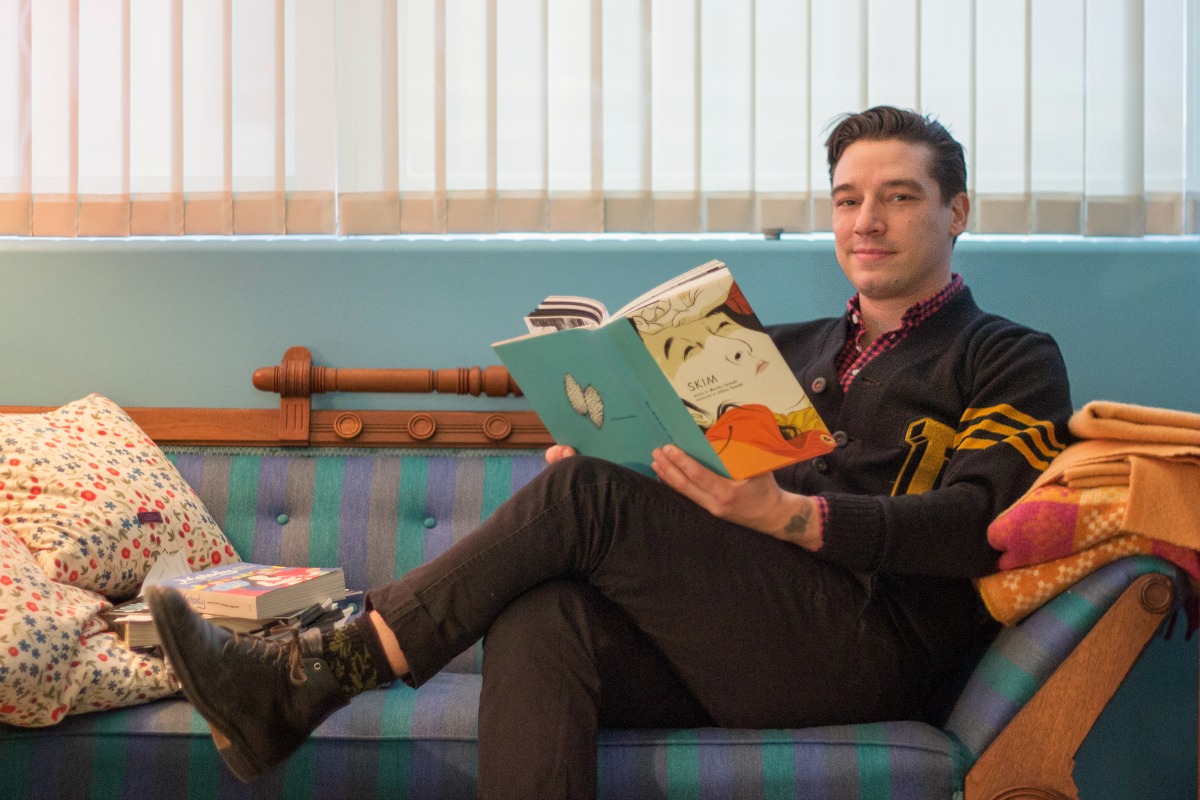David Lewkowich knows something about the stress teachers can experience when they start out in their chosen careers because he’s been there himself.
“When I worked as a high school teacher, I had a year of insomnia,” says Lewkowich, now a professor and researcher in the University of Alberta’s Faculty of Education.
“Since that time I’ve been trying to understand why I had such an emotional breakdown when I was teaching high school, and I think it was because I hadn’t done enough emotional work to recognize how my own adolescence still persisted within who I am.”
Lewkowich, who teaches in the Department of Secondary Education, explores how graphic novels can be a valuable catalyst for reflection and conversation with education students about the teenagers they were and the teachers they want to be.
“I really want to prepare my students emotionally for the challenges of teaching, and I think that going back and allowing them to think about adolescence through the lens of literature allows them to somehow access that—knowing that they can never access the past directly but that somehow they can touch the feelings associated with their adolescence, so they won’t be so surprised when they see it again in others.”
Using comics to elicit teenage memories
Lewkowich’s research, funded by the Social Sciences and Humanities Council of Canada and entitled “Comics and the Emotional Situation of Learning to Teach,” grows from an abiding interest in reader experience and the way in which reading comics constitutes a unique experience in the mind of a reader.
“I find there’s something about the comics form that makes all readers a type of beginner because no one’s been schooled in how to read comics, and it’s one of the forms that I feel is most open to interpretation,” he says. “There’s a lot of things a reader has to do to make sense of them, even if they don’t know they’re doing them—that they’re inserting a lot of their own life into the text because from one panel to the next you’re not being given every single moment of what a character is doing.”
To elicit recollections of their adolescence from his research participants—all of whom are bachelor of education students who plan to be English teachers—Lewkowich has selected graphic novels that dwell on adolescence and often take place at least in part at school: Mariko and Jillian Tamaki’s Skim; Lisa Wilde’s Yo, Miss; Lynda Barry’s The Freddie Stories; and Drama by Raina Telgemeier.
Rather than just discussing the content and structure of the texts, Lewkowich has participants identify a frame from the story that resonates with them and then create their own visual response, which becomes part of the discussion.
“They’re not schooled artists—they’re English teachers—so they have a certain mastery of language, but I’m interested in taking away that mastery, to get people to question that mastery and to risk their representational skills in ways that they may not feel like they’re expert in,” Lewkowich says.
Becoming empathetic educators
Teacher education engages students in a process of reflection, and Lewkowich believes that the combination of imagery and text in graphic novels and in the visual responses he sees provide a richer site for reflection than imagery or text alone might provide. This process of reflection enables aspiring teachers to reconnect with what he calls “the adolescent disavowed” and potentially help them become more empathetic in the classroom.
“There’s something about our own adolescence that in order to grow we’ve had to disavow, we’ve had to forget, but reinhabiting the adolescent disavowed can allow teachers to prepare themselves emotionally for the task of being a teacher,” Lewkowich says.
Feature image: Education professor David Lewkowich leafs through his copy of Skim, one of the graphic novels he uses in the classroom.
